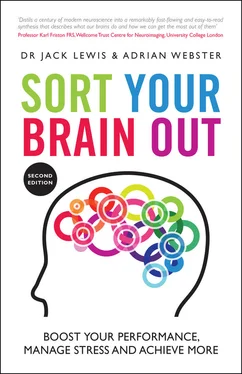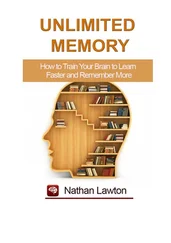With shortcuts at the very heart of human nature we are all, unsurprisingly, more than happy to take the quickest option that modern technology can provide. And with the prospect of life improvement being at the forefront of our minds, at the earliest opportunity most of us will interface with whatever the latest technology happens to be, in the belief that it's going to make life easier or more interesting. This is an assumption that many people end up regretting.
We may always be looking for the fastest, easiest route forward, using a whole array of “external brain” devices at our disposal, ranging from laptops to smartphones. We may have found numerous new ways of shifting a lot of the workload to them. But that doesn't necessarily mean that our brains are going to have less to do. Nor does it mean that they are going to become lazier and inevitably, having become semi‐dormant, find themselves out of a job.
On the contrary, a lot of the groundwork might be done for us, but by shifting it we simply free up cognitive resources for a new pile of (often unnecessary) extra work, along with a whole new set of pressures and obstacles created by it. All of which will need to be overcome and dealt with at an ever‐increasing rate.

When calculators first came onto the scene there were serious concerns that they would make minds stagnant by taking away the need for mental arithmetic. More recently, when internet search engines first appeared, there was much talk about them making brains intellectually lazy. In both instances, very little evidence accumulated to back up these concerns. Instead it seems that both innovations mostly unlocked new possibilities and, brains being brains, they have moved onto bigger, more exciting challenges.
Despite how much new technology arrives on the scene, if we fully utilize it in a way that finds balance with the non‐technologically enhanced aspects of life, our brains should be moving in the opposite direction to idleness. Having once been stretched to the limit by performing a particular function, they should find themselves having to grapple with completely different tests in new areas.
For example, where a brain was once challenged by the prospect of map reading, advancements in technology will mean that, despite no longer having to be quite so proficient in that skill, it will have to rise to the challenges of operating and following the instructions of satnav, but while still using your loaf. Those of us who have experienced setting off from A to go to B only to end up in C will know that this is no mean feat. Despite thousands of years' worth of inherited instinct and our gut feelings screaming at us that we are heading in completely the wrong direction, we still keep faith with the technology. It's important to be master, not slave, to our technologies; you still need to be the boss.
“The greatest task before civilisation at present is to make machines what they ought to be, the slaves instead of the masters of men.”
Havelock Ellis
Your satnav doesn't have common sense – you do. Map reading and navigation are useful skills to have, particularly in the event of a technical hiccup. If you want to hold onto them, maintaining your self‐navigational skills is simple. Don't rely on satnav all the time, especially when you want to get to places you've been to many times before.
Think of all those drivers of London's black cabs whose inflated hippocampi shrink back down after they retire. You need to keep on reusing those navigation pathways of your brain to keep them fresh. Before switching on the satnav, take a look at your route on a map to give yourself an idea of where you're going.
The cognitive gymnastics required to convert a 2D map into a mental picture of the route you'll be taking in the 3D world gives parietal brain areas involved in “mental rotation” a great workout. And hopefully, the next time you find yourself driving the wrong way down a one‐way street, in the middle of a building site or along a road that doesn't exist, common sense will prevail.
The bottom line is that whether or not a brain does get made redundant is of course up to its owner. Neither technology nor the brain itself can be blamed if, through lack of appropriate stimulation, certain parts get left behind. Provided you give your basic cognitive abilities regular chances to be stretched, your brain is more than capable of keeping up.
As far as brain health is concerned, making use of technology is not in itself a problem. What is currently causing alarm in some circles is the increasing number of people who are becoming permanently hooked into and addictively dependent upon, certain types of technology.
Even the less observant will have noticed the blind reliance that more and more people are placing in their devices. Taking a few moments to reflect upon the behaviours of people you see each day will surely convince you that an obsession with gadgetry is taking over people's lives. Walk down any busy street in any town and it won't be long before you see someone scurrying along the pavement, head down, squinting at some device or other – only to step out into the road without looking.
With minds elsewhere, these digital lemmings seem completely oblivious at times as to just how close they are to eradicating themselves from the human gene pool. Perhaps their need to be permanently technologically engaged drowns out their awareness of everything else around them or maybe an overestimation of their own ability to multitask is leading to more subtle cognitive drawbacks than being hit by a bus.
Whatever the reason, many people are becoming too dependent on their smartphones for their own good. One of the classic measures of overdependence is automated, unthinking behaviour. How often have you seen people in your midst failing to resist the temptation to pull out their phone the moment they hear it beep, buzz, ring or feel it vibrate? Have you noticed that this often happens regardless of whether or not the circumstances make it appropriate to do so? The most popular times seem to be during meetings, in restaurants or while attempting tricky driving manoeuvres.
Should such unsociable, at times rude and potentially dangerous tech habits be tolerated on the basis that “you can't stop progress?” There is no definitive answer to this; it is down to each and every one of us to decide for ourselves. One thing, however, is becoming apparent, whether it is you, family members, friends, colleagues or complete strangers that you've witnessed doing this – it's a fairly safe bet to make that you are now so familiar with these scenarios that you're beginning to accept them as the norm.
On a related topic, “cybermigration” describes a phenomenon where certain new behaviours slowly become acceptable online and then, before you know it, those same types of behaviour suddenly become tolerated in the real world too. When this kind of thing happens, people can unwittingly find themselves affected by cultural changes driven through technology, even if they don't use it themselves!
Tech natives who spent most of their adolescence in a world where more or less everyone owned a smartphone may have become more self‐conscious than previous generations. Teens used to be notorious for acting out, taking risks to show off to their friends or play the fool. Now that everybody has a camera on them and in seconds the photos they take can end up on the internet forever, young people have become more wary about taking the chance of getting snapped doing something stupid.
Читать дальше













